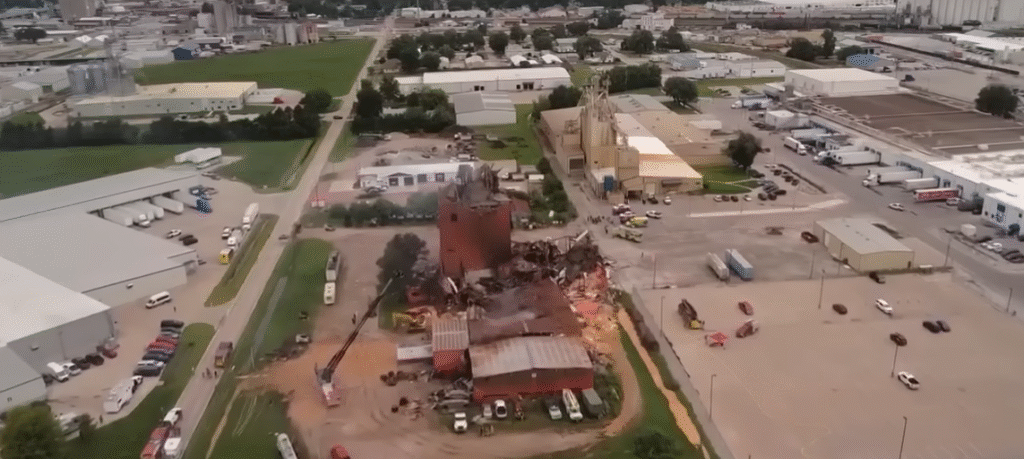Using waste wood as a sustainable feedstock, Horizon Biofuels has established a reputation for manufacturing high-quality wood pellets for industrial and heating applications. The facility catered to farmers and companies looking for eco-friendly substitutes under the Elkhorn Valley Animal Bedding brand. However, on July 29, 2025, a devastating dust fire caused an explosion that destroyed the facility and killed three people, turning a nearby renewable energy supplier into the subject of a nationwide safety inquiry.
In order to determine what went wrong, the U.S. Chemical Safety and Hazard Investigation Board stepped in right away. Combustible dust, a well-known but frequently overlooked industry hazard, was the cause, according to the State Fire Marshal. Horizon had previously issued warnings. In 2012, OSHA imposed fines for severe infractions, such as neglecting to maintain machinery, provide hazard training, and control dust. Although noteworthy, these citations were not exclusive to Horizon; the bioenergy sector as a whole has been subject to similar scrutiny, especially as small-scale operations attempt to meet rising demand without making commensurate investments in safety infrastructure.
Under the correct circumstances, dry, fine particulate matter that is highly flammable is used in biofuel plants. As evidence that containment and filtration efforts may not have been adequate, the Nebraska Department of Environment and Energy had previously discovered wood dust outside the facility’s boundaries earlier in the year in the case of Horizon. Many industry insiders believe that this incident is eerily reminiscent of previous tragedies, like the 2008 Imperial Sugar explosion, in which a deadly chain reaction was caused by accumulated dust.
Horizon Biofuels – Key Information
| Attribute | Details |
|---|---|
| Company Name | Horizon Biofuels, Inc. |
| Location | Fremont, Nebraska, USA |
| Industry | Bioenergy / Wood Fuel Pellets |
| Founded | Not publicly disclosed |
| Products | Wood fuel pellets, animal bedding (Elkhorn Valley Animal Bedding) |
| Production Capacity | 20,000 short tons annually |
| Workforce | Approximately 10 employees |
| Notable Incident | July 29, 2025 explosion caused by combustible dust fire |
| Casualties | 3 fatalities – Dylan Danielson, Hayven Danielson, Fayeah Danielson |
| Reference | www.csb.gov/horizon-biofuels-explosions |

The passing of Dylan Danielson and his daughters, Fayeah and Hayven, gave the technical cause a human face. According to friends, Dylan is a very trustworthy craftsman, a loving father, and a neighbor who cares about the community. The girls were well-known for their lively dispositions and involvement in school athletics. Their passing inspired Fremont residents to hold vigils, collect money for surviving family members, and start pushing for stricter regulation of industrial activities close to residential areas.
The tragedy has sparked discussions about striking a balance between the quick expansion of renewable energy and the strict safety regulations needed for these sectors on a national level. Some businesses have already revealed plans to review their worker training programs and dust suppression systems, including renewable projects supported by well-known environmentalists. These steps are especially helpful in averting such occurrences and safeguarding the industry’s reputation as a force for long-term development.
Instead of levying penalties, the CSB makes suggestions to avert catastrophes in the future. Numerous industries have seen a significant improvement in safety standards as a result of previous CSB findings. According to a number of experts, Horizon’s case may serve as a model for updating industry standards for biofuels, promoting the use of automated shutdown systems, improved dust monitoring technologies, and open safety reporting.
Crews stayed on the scene for days even after the fire was contained, exercising caution when near the facility’s structurally precarious remnants. A somber landmark is the burned-out grain tower, which is still standing but dangerous. The fact that safety fences keep people at least 200 feet away emphasizes how dangerous such explosions are physically, even after the immediate crisis has passed.
The explosion has changed the way that local industry is discussed in Fremont. In keeping with a growing national trend to incorporate safety concerns into the approval process for industrial plants, officials are considering tighter zoning regulations. Both regulators and urban planners see this as an opportunity to connect sustainable development with unwavering protection for workers and communities.
The larger bioenergy industry must now decide whether to view the Fremont tragedy as a singular occurrence or to use it as a springboard for reform in the entire sector. Change advocates contend that safer operations protect the reputation of renewable energy in the long run in addition to saving lives. After all, if the production process endangers the lives of locals and employees, a green product loses its appeal.
In many respects, the Horizon Biofuels explosion marks a sea change. It serves as a reminder that the shift to cleaner energy needs to be accompanied by a dedication to risk mitigation and operational excellence. The industry can advance toward a future where renewable production is not only environmentally sound but also remarkably effective at protecting human life by implementing particularly creative solutions, such as smart particulate sensors, improved ventilation, and community safety engagement.

